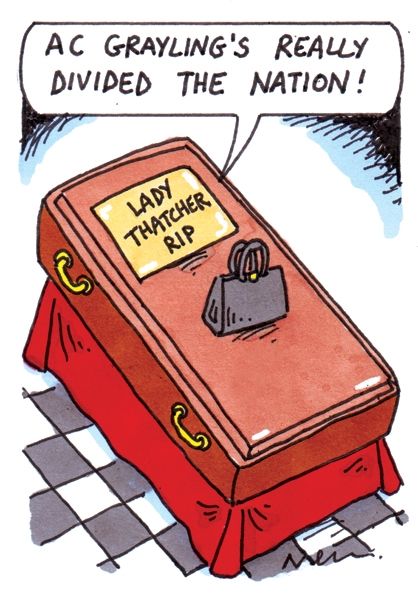
- After two years of taking flak from the Left for setting up an £18,000-a-year liberal arts college, A.C. Grayling is now in the cross hairs of the Right. His crime: not enough deference to the late Baroness Thatcher after writing in The Independent on 9 April that celebrations over her death are “understandable and justifiable” and that “death does not confer privileges”. In The Times on 11 April, Libby Purves said the “modish entrepreneurial professor” was indistinguishable from the “crazed hard-Left” rabble-rousers taking part in “riotous street parties”. Professor Grayling, who ironically has been accused of establishing a Thatcherite higher education institution, the New College of the Humanities, was condemned by Ms Purves for his “self-importance and half- baked anthropology” before she concluded that his views represent “all the smug, narrow, self-regarding, inhumane, mechanistic aridity of atheist academe”. Enduring such an attack from the Iron Lady’s defenders might yet win back Professor Grayling a few friends in the university fold.
- When former Conservative leader William Hague boasted of drinking 14 pints a day as a student, most thought it unlikely. But apparently some students drink up to 100 units a day - more than three times the amount Mr Hague put away, according to the Daily Mail on 12 April. In a “warning to all teenagers and their parents”, the paper related how one student, Emma Gould, “became hooked on alcopops at the age of 15 and was soon downing up to 100 units a day”. She fitted her drinking around her lectures - starting early at 7am before collapsing at 6pm after a full day on campus. Ms Gould, then a biomedical student at the University of East Anglia, said she was soon heading to Ipswich’s red-light district to work as a prostitute to fund her habit. Now teetotal, she shared her story to raise awareness about the perils of booze.
- Australia is to slash A$2.3 billion (£1.6 billion) from the higher education budget to fund school reforms, The Australian reported on 14 April. The cuts by Julia Gillard’s Labor government are the biggest to the sector since John Howard’s 1996 budget. Craig Emerson, the tertiary education minister, said the government would place an “efficiency dividend” of 2 per cent on university funding in 2014 and 1.25 per cent in 2015, saving about A$900 million. It will also scrap the 10 per cent discount for students who pay tuition fees up front. Most of the money - A$1.2 billion - will be saved by forcing students to repay A$2,000 start- up scholarships once they hit a salary threshold. The announcement is a blow to Universities Australia, which earlier this year launched a A$5 million lobbying campaign ahead of September’s federal election to highlight the need to invest in the sector.
- The National Union of Students in Scotland has sought to pile pressure on the Edinburgh government to curb the pay of senior figures in the country’s universities, revealing on 15 April that 88 individuals in the Scottish academy earn the same or more than the £140,000 a year paid to Alex Salmond, Scotland’s first minister. The NUS wants a maximum ratio between the highest and the lowest earners, although their call went unheeded in a new draft code of governance for the sector, published on 16 April. The salary data perhaps shed new light on why Louise Richardson, principal of the University of St Andrews (salary £225,000 a year), told the Herald earlier this month that £9,000 a year was “very little to pay” for a degree from her illustrious institution.
- Academics and scientists criticised the government for what they described as a last-minute bid to water down libel reform, The Independent reported on 15 April. Ministers announced that they would seek to overturn a cross- party consensus that companies should have to show financial damage before they can sue a journalist or blogger when the defamation bill returned to the Commons this week. Simon Singh, the science writer who led the campaign to reform the UK’s defamation laws after he was sued for criticising the “bogus treatments” offered by some alternative medicine providers, said the amendment - which was expected to be voted on after Times Higher Education went to press - meant that there would be no protection for those who tried to make similar statements in the future.